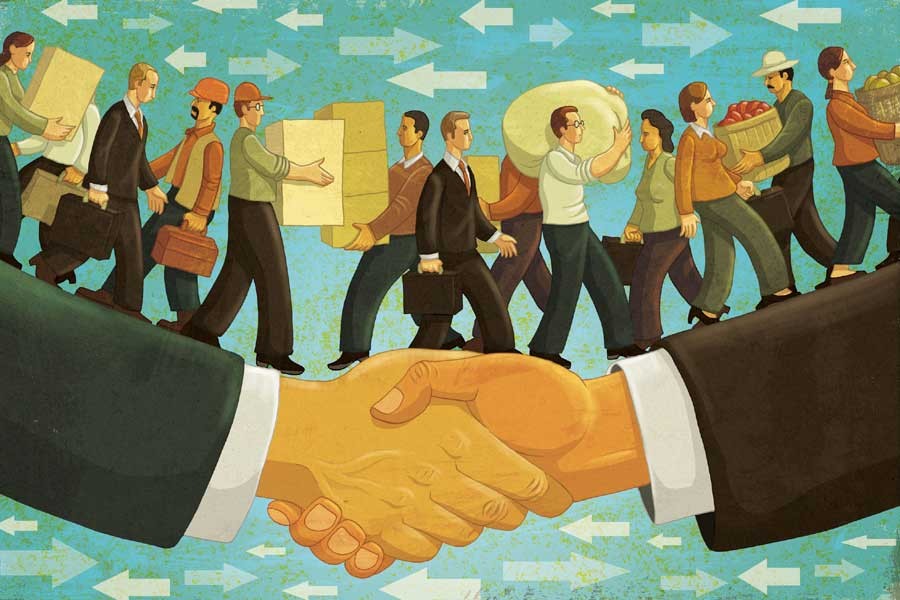In what we are now through, prescriptions are not rare for economic recovery coupled with counselling -- both temperate and imposing -- to convince people about ways that can contain the raging pandemic.
The latter, recognisably the foremost concern for surviving the calamity and saving lives, is causing more and more anxious and probing eyes glued to smartphones for most of the time of the day and also night. Clearly, it is the social media, now in its full sway and swing, that is being generously used to dispense lessons-- not necessarily from informed sources or sensible reporting but also from tittle-tattle, even outrageous rumours. All these are happening because of the absence of proven or scientifically tested findings, though as an optimist, this scribe hopes and believes medication is on the way. Vaccine may take a while to be foolproof through human testing across geographies and fulfilment of other required parametres.
As for economic recovery and ways to get going through the pandemic and in the post-pandemic period, suggestions are not hypothetical, and not in the least unfounded. As countries are compelled to shut non-essential businesses and people are asked to stay indoors, the pandemic is taking its terrible toll on people's livelihood that demands cool and calculated policy response. Experts, economists and governments are trying to find a way out to keep things afloat and not plunge too deep in order that a workable mechanism works. Millions of people confront the prospect of unemployment and prolonged economic misery. Dozens of emerging economies face financial and humanitarian distress as commodity prices and export earnings plummet, foreign investors flee and remittances from overseas workers decline. Supply and demand shocks have severely disrupted international trade. Decades of deep economic integration have restructured international trade and investment. In modern global value chains, production processes are often spread across dozens of firms operating in multiple countries. Multi-national value chains have been interrupted by border closures. Travel and tourism have collapsed.
Airlines are counting extremely heavily due to cancelled flights -- a traumatic situation that might cause many liners stop operations for good. Ocean shipping that transports the bulk of trade in manufactured items, food, energy and raw materials has thus far been comparatively spared, but crew members have been caught up in pandemic-related travel restrictions. Credit market stresses are reducing the availability of trade finance, making it harder for willing traders to strike deals.
The World Trade Organisation's economists have come up with an estimate that says world merchandise trade this year will fall by between 13 and 32 per cent. Their calculations are subject to uncertainty about how Covid-19 and its economic impact will evolve. But to put these figures in perspective, an optimistic scenario would at best be worse than a 12 per cent drop-- same as that experienced at the height of the global financial crisis in 2008-09. The pessimistic scenario would be on a par with the fall in world trade seen during the first three years of the Great Depression, from 1929 to 1932.
Governments all over the world and central banks are trying to mitigate the pandemic's economic fallout with packages of fiscal and monetary support to prevent debt default, bankruptcy and job losses. Yet the unusual nature of this recession complicates the immediate policy response. Instead of spending money to get people working and consuming again, countries need to incentivise people staying home without work and in that the importance of disaster relief appears to be the main recourse-- not just in poor countries like ours but in advanced countries as well.
WTO director general Roberto Azevêdo, however, harbours hope that with strong facilitations in place, the impending disaster can be largely encountered by trade. As he writes in The Guardian, "Even as the crisis rages, governments must start planning for its aftermath. On the economic front, this means laying the foundations for a strong and socially inclusive recovery. Trade - and international coordination more generally - will be important ingredients here." He is hopeful that a strong recovery is possible. The fundamentals of the economy remain solid, he writes, even though the fuel line to the engine has been cut off. What we need to do is make good policy decisions, and give businesses, households and would-be entrepreneurs reasons to be confident about the future, he comments adding, "WTO economists estimate that if the pandemic is brought under control relatively soon, trade and output could potentially rebound nearly to their pre-pandemic trajectory as early as 2021."
In this context he comments that trade is a valuable complement to fiscal and monetary measures. Referring to the 2008-09 recession, he reminds us that at that time governments kept the global economy broadly open which helped offset some of the shortcomings of fiscal and monetary policy. Countries were able to tap into each other's growth. Households and companies did not struggle much despite higher prices and supply shortages. This time, too, all three forces - fiscal, monetary and trade - must pull together, he writes. Though it is true that this time trade entered this crisis in a fragile state: weighed down by protectionist measures which would add self-inflicted economic shocks to many economies.
Mr. Azevêdo warns that the notion that less interdependence makes economies more resilient is wrong: autarky in food and other essentials would make countries more, not less, vulnerable to the economic consequences of localised crises such as droughts, hurricanes and earthquakes. Supply chain diversification, a more reasonable objective, would be better served by predictable global trade rules than by haphazard protectionism.
True, his basic premise is openness or what he would prefer to say the benefit of multilateralism -- a reality that despite criticism does hold hope for resurgence of global economy via trade.


